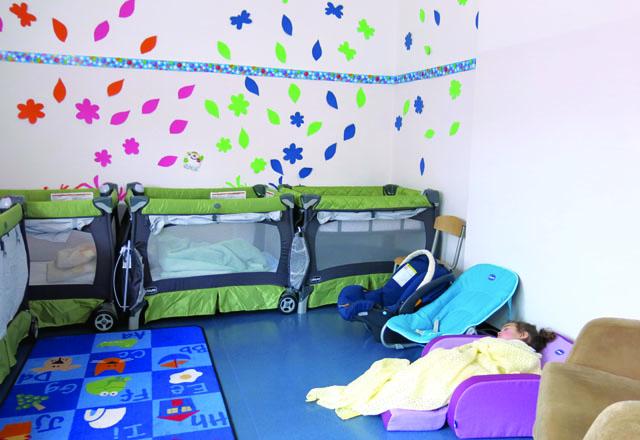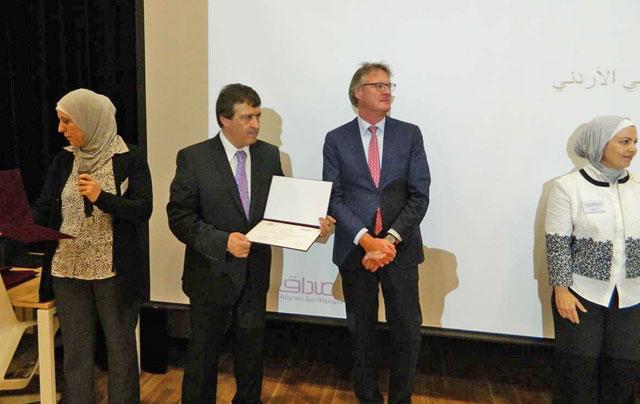You are here
Activists want crèches at public sector departments
By Rana Husseini - Aug 25,2014 - Last updated at Aug 25,2014

AMMAN — The Jordanian National Commission for Women (JNCW) on Monday sent a memo to the government demanding the establishment of crèches in public sector institutions.
In its memo, the JNCW asked the government to amend the civil service by-law to include the establishment of nurseries for working women.
The memo also called for working women’s right to be able to receive family allowances if their spouses are not working under the by-law and to get extra allowances for their children similar to what men get.
“We learnt that the government was re-examining the by-law and decided to list these demands in the hope that they will be considered by legislators,” JNCW Secretary General Salma Nims told The Jordan Times.
The required procedures would not be complicated since the regulations will only be examined and endorsed by the government and then sent to His Majesty King Abdullah for approval, according to Nims.
“If nurseries are established at government institutions at a reasonable cost, it will surely enhance women’s participation in the labour market, further strengthen children’s rights and ensure a safe environment for them,” Nims told The Jordan Times.
This, she stressed, will also “guarantee that women will continue to work and get paid, and [eventually] receive a retirement salary”.
Sadaqa campaign core team member Randa Naffa welcomed the JNCW move, saying it was important since “a high number of women work in the public sector”.
Sadaqa manages campaigns for the active implementation of the Labour Law across the country, including Article 72 that was introduced in 1996 and states that nurseries must be established at private sector workplaces.
The Labour Law stipulates establishing crèches at companies with more than 20 female employees; however, this provision, until a recent Labour Ministry campaign, had been scarcely implemented over the last two decades.
“More and more private sector employers are beginning to comply with Article 72 of the Labour Law by opening nurseries,” added Naffa, a gender specialist who has worked on this issue within the Sadaqa campaign for the past three years.
“Our campaign focused on sectors such as factories, banks, telecommunication companies and educational institutes because they have the highest percentage of female employees,” she explained.
The female employment rate in the Kingdom, which stood at 14.1 per cent out of a workforce of about 1.7 million in 2012, is the lowest in the Arab world, according to a new report by the JNCW.
The rate of economic participation of women in Jordan, which grants a three-month maternity leave, is among the lowest in the world according to a World Bank report released earlier this year.
The report said that Jordan’s female economic participation rate stands at 22 per cent, about a fourth of that for men (at 87 per cent).
According to a report issued by the Department of Statistics to mark International Women’s Day earlier this year, women constitute approximately 3.1 million of the Kingdom’s 6.3 million-strong population.
The report showed that women’s contribution to the labour market in the Kingdom was 13.2 per cent in 2013, with 51.4 per cent of them working in the public sector.
However, a study conducted by the Phenix Centre for Economic and Informatics Studies last year, put the figure at 12.3 per cent, with 48 per cent employed in the public sector.
Another report issued by the Higher Population Council in 2013 also showed that Jordanian women’s contribution to the economy remains low, especially among married women.
The study, which focused on the impact of marriage and fertility in determining women’s work status, found that females constituted 14 per cent of the workforce, up from 12.3 per cent in 1995 and 11.5 per cent in 1990.
Related Articles
Private sector representatives on Wednesday met with government agencies and SADAQA members to discuss ways to overcome obstacles to open crèches in their own establishments.
Working mother of three Rania Kayali is one of the biggest beneficiaries of a crèche that opened at her workplace, since her newborn baby is close to her.
AMMAN — Crèches at workplaces are not a luxury, but a national necessity amid the “horrifying” unemployment rates among Jordanian women, acc












